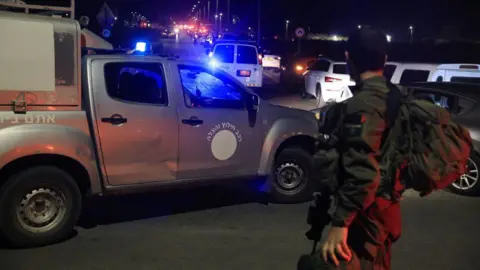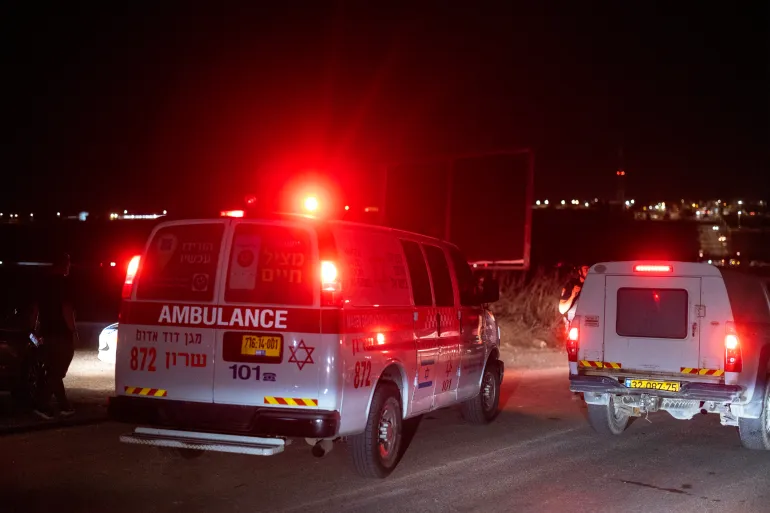Hezbollah claimed responsibility for a drone strike on northern Israel on Sunday, injuring over 60 people, as the recent conflict between Israel and Hezbollah forces escalated. The attack took place in Binyamina, located south of Haifa, marking one of the most significant incidents since hostilities intensified in late September.
The Lebanese Health Ministry reported that Israeli airstrikes across Lebanon killed 51 people on Saturday alone.
As Israel continues to strike southern Lebanon, UN peacekeepers expressed concerns about being caught in the crossfire. They reported that Israeli troops forcibly entered a United Nations position with two tanks. This followed a call by Israeli Prime Minister Benjamin Netanyahu for UN forces to withdraw from the area. The Israeli military later stated that a tank had accidentally backed into the UN post while under fire.

Hezbollah stated on Sunday that it deployed a squadron of attack drones targeting a military training base in Binyamina, approximately 30 kilometres (20 miles) south of Haifa. The group claimed the strike was in retaliation for Israeli airstrikes earlier in the week, which Lebanon’s health authorities said had killed at least 22 people in central Beirut.
The Israeli volunteer rescue organization, United Hatzalah, reported that its teams attended to over 60 casualties in Binyamina, with injuries ranging from mild to critical.
Hezbollah has been launching frequent rocket and drone attacks on Israel for more than a year, aligning itself with Hamas militants in Gaza. However, its recent attacks have reached deeper into Israeli territory since the escalation of the conflict in late September. Despite Israel’s advanced air defence systems intercepting most incoming missiles, the damage and casualty figures have been rising.
Israel has intensified its airstrikes beyond Hezbollah’s usual strongholds in southern Beirut, extending its invasion into other parts of southern, eastern, and central Lebanon. According to Israel, its air force has targeted Hezbollah launchers, anti-tank missile posts, weapons storage facilities, among other sites, while its ground troops reported eliminating numerous Hezbollah members.
Lebanon’s National News Agency (NNA) confirmed that Israeli forces have escalated their attacks in southern Lebanon, carrying out airstrikes on several border villages. Hezbollah responded by launching rocket attacks and engaging Israeli soldiers attempting to infiltrate border villages.

UN peacekeepers, part of the UNIFIL mission, accused Israeli troops of forcibly entering one of their positions in the Ramia area, which left five peacekeepers injured. Israeli authorities later clarified that a tank had briefly entered the UN site under heavy fire during an evacuation operation.
The UN Secretary-General, Antonio Guterres, condemned the attacks on peacekeepers, warning that such actions could constitute war crimes. The UNIFIL mission, comprising around 9,500 troops, operates in southern Lebanon under UN Security Council Resolution 1701, which mandates that only Lebanese military and UN forces should be present in the region.
In response to the escalating violence, French President Emmanuel Macron urged Iran’s President, Masoud Pezeshkian, to support a general de-escalation in Lebanon and Gaza.
As tensions rose, the Pentagon announced the deployment of advanced air defence systems to Israel to help counter potential Iranian missile threats. This move comes after Iran’s top diplomat, Abbas Araghchi, stated in Baghdad that Tehran is fully prepared for a war situation while stressing that Iran does not seek conflict.
The recent conflict continues to have devastating consequences. Gaza’s health authorities report over 42,200 deaths, primarily civilians, since Israel’s military offensive began. In Lebanon, the death toll has surpassed 1,300 since late September, according to official figures, exceeding the casualties from the 2006 conflict.


